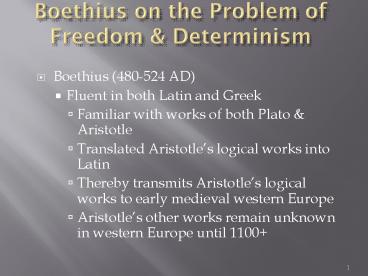Boethius on the Problem of Freedom - PowerPoint PPT Presentation
Title:
Boethius on the Problem of Freedom
Description:
Thereby transmits Aristotle s logical works to early medieval western Europe ... imprisoned & executed While imprisoned composed The Consolation of Philosophy, ... – PowerPoint PPT presentation
Number of Views:134
Avg rating:3.0/5.0
Title: Boethius on the Problem of Freedom
1
Boethius on the Problem of Freedom Determinism
- Boethius (480-524 AD)
- Fluent in both Latin and Greek
- Familiar with works of both Plato Aristotle
- Translated Aristotles logical works into Latin
- Thereby transmits Aristotles logical works to
early medieval western Europe - Aristotles other works remain unknown in western
Europe until 1100
2
- Roman Proconsul to Emperor Theodoric
- Christian, opposed to Arian heresy, which denied
the full divinity of Christ and which was
espoused by Theodoric - Accused of treason, imprisoned executed
- While imprisoned composed The Consolation of
Philosophy, which includes an analysis of the
problem of freedom and determinism
3
Freedom Determinism
- Is Human Freedom Compatible with Gods
omniscience? - If God already knows with complete certainty
whatever you will ever do, how could your future
be up to you to determine? - How could you be genuinely free in planning your
life and enacting your plans if God already knows
what you will plan and what you will do?
4
The Preliminary Argument
- God foreknows everything that will happen
- So, God foreknows my future in full detail
- What God foreknows must happen exactly as it does
happen - Hence, my future must happen exactly as it does
- If my future must happen exactly as it does, then
my future is necessary - Thus, my future is necessary
- If my future is necessary, then I am not free
- Consequently, I am not free!
5
Boethius Rejects the Preliminary Argument
- The preliminary argument conceals a mistake
pertaining to how the concept of necessity
appears in the argument - It is true that if my future is necessary, then I
am not free - But the argument fails to prove that my future is
necessary - Hence, the argument fails to prove that I am not
free
6
The Hidden Error in the Preliminary Argument
- Mistaken version of argument
- If God foreknows the future, then the future is
necessary (This is the mistaken assumption,
according to Boethius) - God foreknows the future
- So, the future is necessary
- If the future is necessary, then I am not free
- Hence, I am not free
- Since Boethius rejects 1, he rejects the
soundness of this version of the argument
7
Boethiuss Corrected Argument
- It is necessary that If God foreknows the
future, then the future will happen as God knows
it - Hence, If God foreknows the future, then the
future will happen as God knows it - God foreknows the future
- So, the future will happen as God knows it
- (4) above does not say that the future, mine or
anyones, is necessary! - Hence, (4) does not preclude freedom, neither
mine nor anyones - Therefore, Gods providence, omniscience and
foreknowledge, as expressed by (1)-(3), is
compatible with freedom after all!































